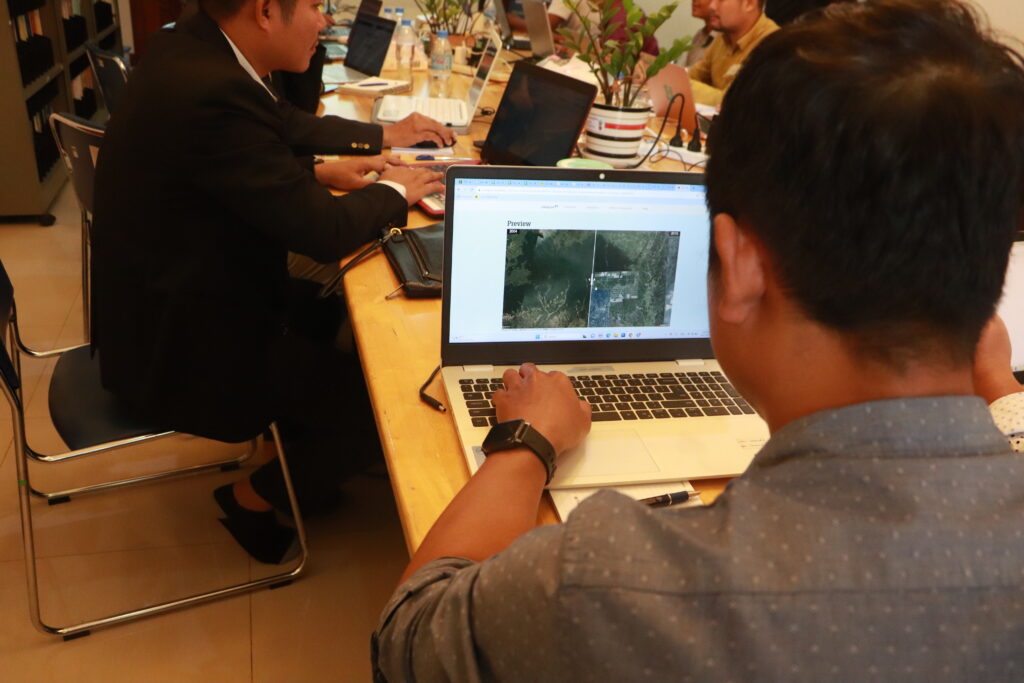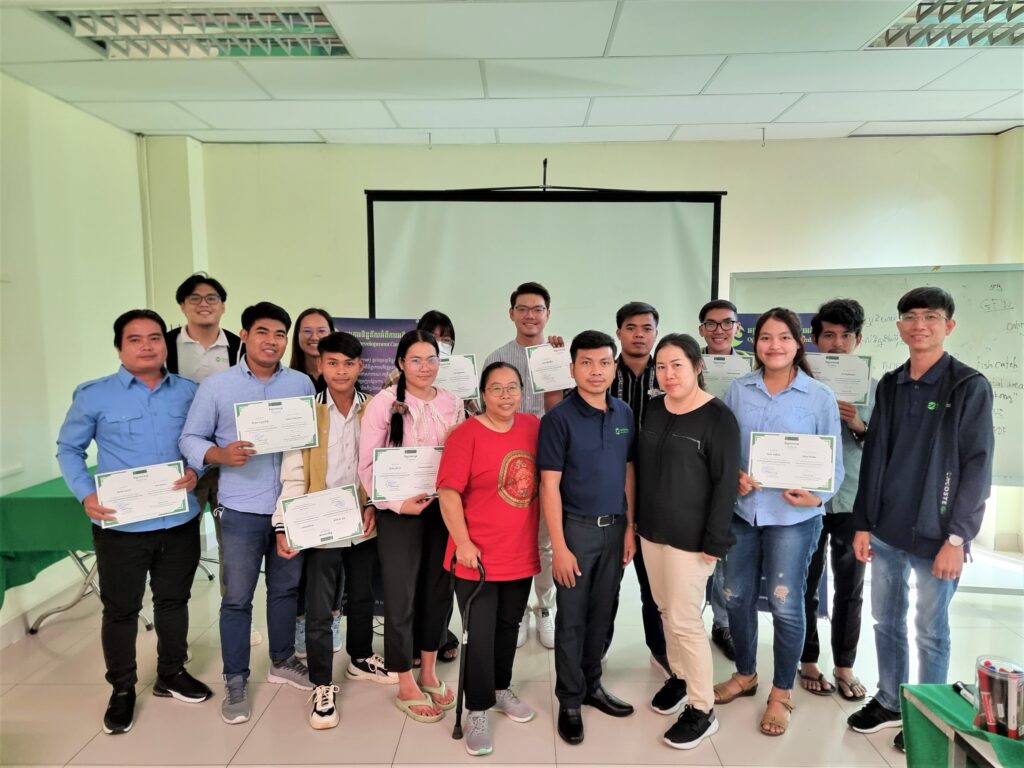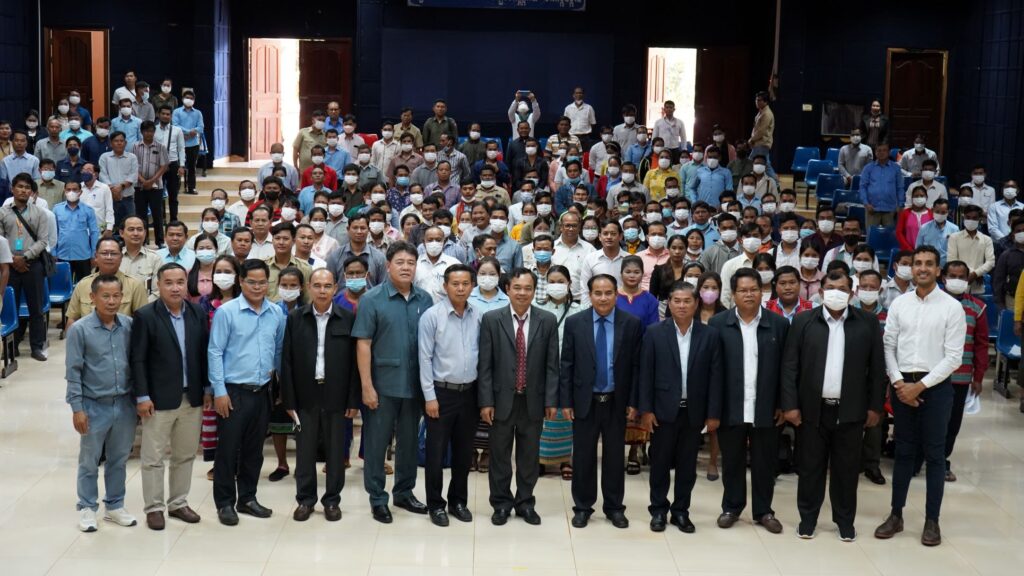- Learning Platform
- Blog
- Sixth Science Talk on the drought situation in Cambodia
CamboJA, in collaboration with the Open Development Cambodia Organization (ODC), organized the 6th Science Talk on the Drought Situation in Cambodia on 30 January 2024. The event was attended by 35 participants (19 women), including representatives of civil society organizations, university students, and journalists.

Thank Mr. Hour Ix, Reginal Drought Management Expert of the Mekong River Commission (MRC), for sharing his experience, knowledge, and expertise on this topic.
This activity is funded by USAID through FHI360, under the Civil Society Support (CSS) project, and co-implemented by CamboJA and the Open Development Cambodia Organization (ODC).

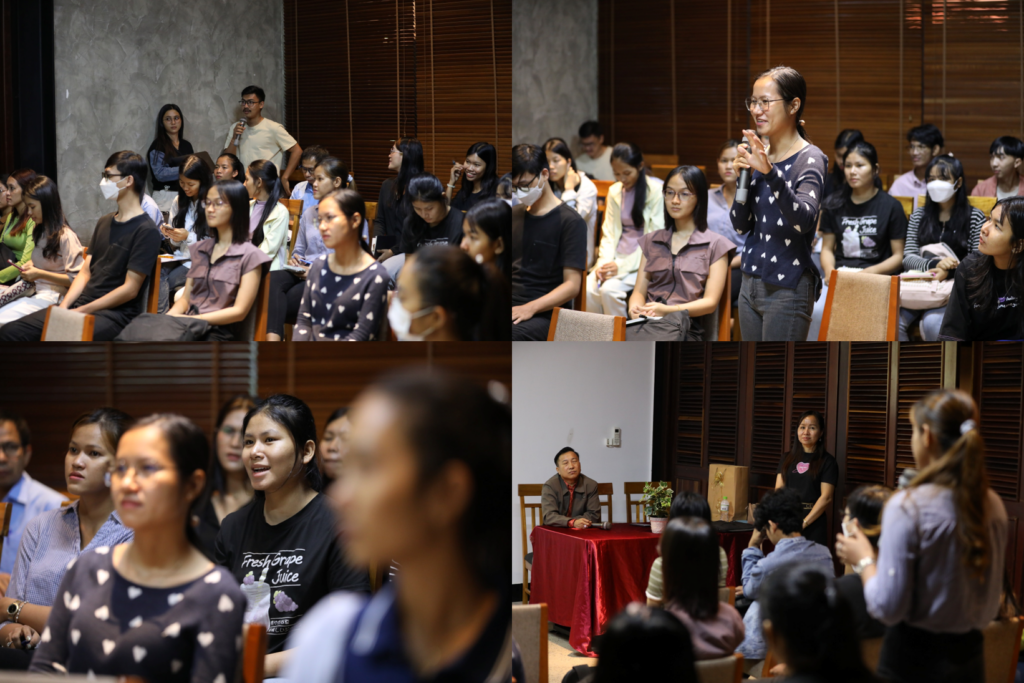
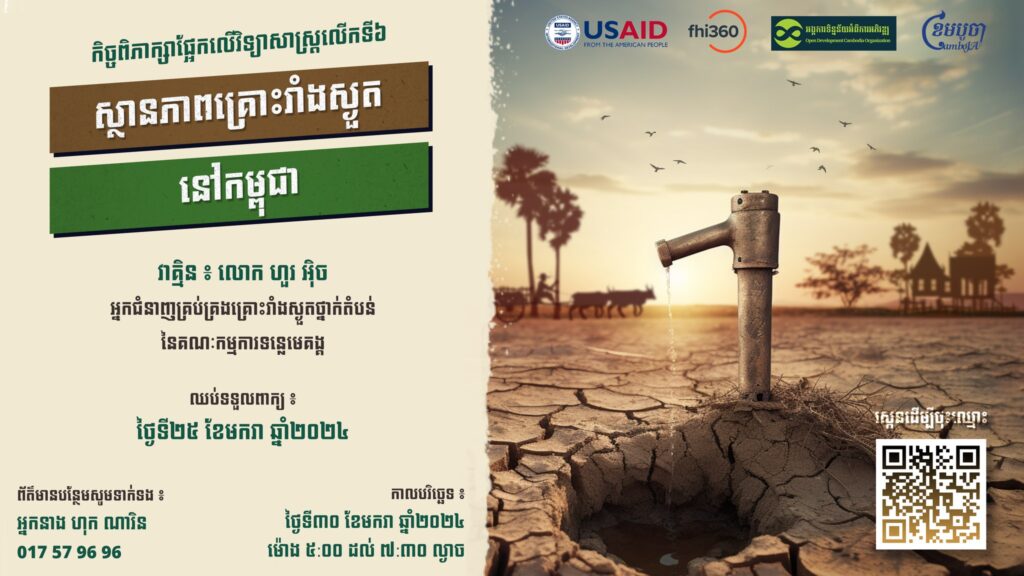
Other Stories
Data visualization training in journalism
On September 11th, 2023, Open Development Cambodia (ODC) conducted an enriching training session titled \"Data visualization in journalism,\" attended by a group of 14 journalists (2 females) from various locations such as Phnom Penh, Kratie, Siem Reap, Battambang, Stung Treng, and Mondulkiri. With our \"Data visualization in journalism\" training, the trainees can embark on a transformative journalistic journey that explores the intersection of data and narrative. Data visualization, the art of transforming raw data into compelling visuals, is more than a skill; it\'s a narrative accelerator. In an age when information bombards our senses, journalists with data visualization skills gain the ability to change complex datasets, transforming them into impactful graphs, interactive charts, and dynamic maps that bring stories to life. This course provides an opportunity to seamlessly combine journalistic skills with data-driven precision, unleashing the potential of visual storytelling to captivate, inform, and inspire. The training aims to equip journalists with the skills to integrate visual elements into their storytelling, enabling them to convey information, engage audiences, and unveil deeper narratives through impactful and accessible graphics. The primary objective of this training initiative is to equip journalists with the proficiency to incorporate visual elements into their narratives. By doing so, they acquire the ability to convey information effectively, engage their audiences, and unveil deeper layers of the narrative through compelling and easily comprehensible graphics. The comprehensive training program explored data comprehension, the principles of data interpretation, the art of chart design, and an introduction to the powerful data visualization tool, Datawrapper. Despite the constraints of time, the participating journalists displayed remarkable adaptability and tenacity, successfully producing visualizations and integrating them into their stories. These hardworking trainees exhibited a worthy commitment to learning this new tool and the concepts surrounding it. Their dedication resulted in the creation of 14 interactive visualizations, each addressing a diverse selection of topics using Datawrapper. While it is acknowledged that their efforts may not yet be considered professional, it is evident that they have acquired a fundamental understanding of how to develop visualizations that enhance their news articles. Furthermore, it notes that the majority of these participants have expressed a strong desire for additional training sessions. They are eager to extend the duration of training and remain enthusiastic about staying updated with the latest data and visualization techniques. These aspirations reflect their solid commitment to enhancing their capacities as journalists and their dedication to delivering high-quality journalistic content to their respective audiences. The project is funded by USAID Cambodia through FHI 360 under a Cluster Anchor Grant from the Civil Society Support (CSS) Project.
- Access to informationData literacy trainingTraining
- 04 Oct 2023
- 2109
Data visualization and storytelling training
Open Development Cambodia (ODC) hosted a training on \"Data visualization and storytelling\" on December 20-21 and 26, 2022, with 24 participants, including journalists, citizen journalists, indigenous youth journalists, journalism students, and CSOs. People with disabilities and LGBTQIA+ are encouraged to join. This training was divided into two parts. The first stage was a two-day online training that included lessons and exercises. The second phase was a one-day physical training session focused on recapping the entire training and exercises. This training was funded by USAID Cambodia through FHI 360 as part of the Civil Society Support (CSS) Project\'s Cluster Anchor Grant. Day 01: Understanding data Before the session began, an ODC representative made a welcoming remark about the project and an introduction to help the attendees get to know one another. Following that, the participant spent time preparing for the pre-test, which was used to assess their capacity before the program began. Mr. Vong Pisith, the trainer, began the lesson on understanding data to provide insight into the importance of data, the different types of data and information, and the transparency of open data. After everyone understood the data well, the trainers demonstrated how to find it using the data portal and Google advanced search. The participants were then given an exercise by finding their needs data in PDF format and other natural resource data on the ODC portal. The trainer, Mr. BAN Chanphalla, then moved on to the next lesson on data standardization, which instructed the participants about data standards and how to format their data before diving into data visualization. The participants were introduced to the function of creating a new spreadsheet, adding sheets, making a copy, columns, and rows, inserting charts, filtering, and pivoting tables on google sheets, as well as importing comma-separated values (CSV) files into the spreadsheet and Microsoft Excel. The trainers also illustrated the data clean as a significant part of the data analysis. This lesson explained why we need to clean data and introduced them to a method for cleaning data to make it legible by introducing techniques such as trimming whitespace, removing duplicates, formatting text, splitting columns, data validation, and finding and replacing. Day 02: Data visualization On the second training day, the trainers took a few minutes to review the previous day\'s lesson before continuing with Mr. Sam An Mardy\'s agenda on data visualization principles. The trainer will introduce what motivated us to create the visualization, what exactly the data visualization is, how to tell a data-driven story, how to choose the right graph and chart type, and how to display it correctly. Mr. Vong Pisith then showed the participants a demonstration and examples of the Flourish. The participants then continue working on the group exercise to create the chart and graph with Flourish. Everyone took the post-test at the end of the second day and looked forward to the physical training on the third day. Day 03: Individual practice The agenda for the last day of training covered lesson reminiscence. Everyone attended the physical training and continued the lesson on data visualization with Flourish. The participants started learning how to make a map chart out of geographical data and how to incorporate those visualizations into the story. Then the participants were given the opportunity to practice it independently and complete the individual assignment by creating storytelling using data visualization. Finally, the trainees were asked to evaluate before closing remarks and provide the training certificates.
- Data literacy training
- 25 Jan 2023
- 904
Land and natural resource governance
Open Development Cambodia (ODC) under the Civil Society Support Activity: Cluster Anchor Grants funded by United States Agency for International Development (USAID) through Family Health International (FHI 360) supported indigenous peoples to participate in the Conference on Land and Natural Resource Governance which was organized by the NGO Forum on Cambodia in Ratanakiri province on 12th - 13th October 2022. The conference aims to engage with the Royal Government of Cambodia to advance laws and policies related to land and natural resources and to strengthen the implementation of policies, laws, and regulations that are meant to promote land and natural resource governance with a focus on addressing social impacts and protecting natural resources and the environment, as well as the sustainable livelihoods of local communities. The event was divided into two phases, which began with gathering input from over a hundred local communities, indigenous communities, community protected areas, forestry communities, and local non-governmental organizations (NGOs). The inputs were used for the panel discussion with the representatives of Ratanakiri, Stung Treng, Kratie, Preah Vihear, Mondulkiri, and Kampong Thom Provincial Governors, Ministry of Interior (MoI), Provincial Departments of Agriculture, Forestry and Fisheries, Provincial Departments of Environment, Provincial Department of Land Management, Urban Planning, and Construction, Provincial Departments of Rural Development, Provincial Departments of Mines and Energy, and private sectors on the second day with a total of 250 people (60 females) participated. Land and natural resource governor in Ratanakiri province Economic land concession within the province is granted to 27 companies, of which 10 companies justified the contract, 06 companies are in the process of revising, and 11 companies have not signed the contracts. The business area is 83,785 hectares, with a total investment area of 181,896 hectares. The area that has been cleared is 56,702 hectares, and the cultivated area is 51,067 hectares. There are 75 indigenous communities recognized by the Ministry of Rural Development, while 85 communities have been recognized as legal entities by the Ministry of Interior. However, only 24 indigenous communities received communal land titles from the Ministry of Land Management, Urban Planning, and Construction. Systematic land registration achieved 15,691 titles which is equivalent to 10,741 families. Two villages have finished the public announcement, while a village is in progress. Two public announcements on the communal land titling are finished and requesting reclassification for three communities. There are 11 community-protected areas and 36 community forestry, of which 22 have been registered with the Ministry of Agriculture, Forestry and Fishery (MAFF). There are 14 community fisheries, and all of them have been recognized while two new communities have been established. Recognize and protect customary land tenure The community and civil society organizations have identified key challenges to recognizing and protecting customary land tenure. Land that has received the land title or is in processing is not yet secured, and the process is complicated, time-consuming, and costly. The approved land classification does not correspond to actual practice and occasionally overlaps with protected areas because management areas have not been clearly divided. Despite the fact that the land has been registered, indigenous peoples continue to face land grabbing and deforestation. According to the community, the forest crime crackdown is still limited and ineffective. The community committee\'s capacity and knowledge are limited and need to be expanded in terms of by-laws and internal rules, while the community\'s livelihood and natural resource conservation must be improved. To address the issues, the communities would like to see strong collaboration between communities and local authorities to strengthen law enforcement with the assistance of district and provincial administrations. The network of community forestry should be established from the national to the commune level. The process of titling communal land should be improved, and the government should provide an annual budget for each community to manage the land and forest while also improving their standard of living. The budget could be used as a community loan for each member. Yet, the results of the suggestions cannot be confirmed.
